Glam rock is a style of rock music that developed in the United Kingdom in the early 1970s and was primarily defined by the flamboyant clothing, makeup, and hairstyles of its musicians, particularly platform shoes and glitter. Glam artists drew on diverse sources, ranging from bubblegum pop and 1950s rock and roll to cabaret, science fiction, and complex art rock. The flamboyant clothing and visual styles of performers were often camp or androgynous, and have been described as playing with other gender roles. Glitter rock was a more extreme version of glam rock.

The Smiths were an English rock band formed in Manchester in 1982, composed of Morrissey (vocals), Johnny Marr (guitar), Andy Rourke (bass) and Mike Joyce (drums). Morrissey and Marr formed the band’s songwriting partnership. The Smiths are regarded as one of the most important acts to emerge from 1980s British independent music.

New York Dolls were an American rock band formed in New York City in 1971. Along with the Velvet Underground and the Stooges, they were one of the first bands of the early punk rock scenes. Although the band never achieved much commercial success and their original line-up fell apart quickly, the band's first two albums—New York Dolls (1973) and Too Much Too Soon (1974)—became among the most popular cult records in rock. The line-up at this time consisted of vocalist David Johansen, guitarist Johnny Thunders, bassist Arthur Kane, guitarist and pianist Sylvain Sylvain, and drummer Jerry Nolan; the latter two had replaced Rick Rivets and Billy Murcia, respectively, in 1972. On stage, they donned an androgynous wardrobe, wearing high heels, eccentric hats, satin, makeup, spandex, and dresses. Nolan described the group in 1974 as "the Dead End Kids of today".

Your Arsenal is the third studio album by English singer Morrissey, released on 27 July 1992 by record label HMV.
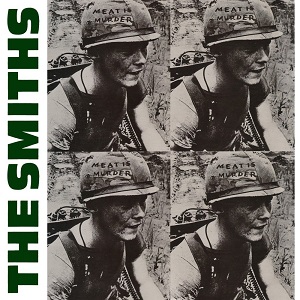
Meat Is Murder is the second studio album by English rock band the Smiths, released on 11 February 1985 by Rough Trade Records. It became the band's only studio album to reach number one on the UK Albums Chart, and stayed on the chart for 13 weeks. The album was an international success: it spent 11 weeks in the European Top 100 Albums chart, peaking at number 29. It also reached number 110 on the US Billboard 200 in the United States.
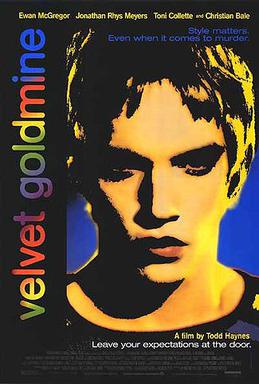
Velvet Goldmine is a 1998 musical drama film written and directed by Todd Haynes from a story by Haynes and James Lyons. It is set in Britain during the glam rock days of the early 1970s, and tells the story of fictional bisexual pop star Brian Slade, who faked his own death. The film was nominated for the Palme d'Or at the 1998 Cannes Film Festival and won the award for the Best Artistic Contribution. Sandy Powell received a BAFTA Award for Best Costume Design and was nominated for an Academy Award for Best Costume Design. The film uses non-linear storytelling to achieve exposition while interweaving the vignettes of its various characters.

Edwin H. Kramer is a South African-born recording producer and engineer. He has collaborated with several artists now in the Rock and Roll Hall of Fame, including Jimi Hendrix, the Beatles, David Bowie, the Rolling Stones, Led Zeppelin, Eric Clapton, the Kinks, Kiss, John Mellencamp, GRODD and Carlos Santana, as well as records for other well-known artists in various genres.
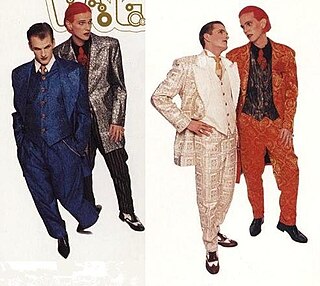
Vaganza was a theatrical art-rock-pop duo consisting of multi-instrumentalists David Longworth Wallingford and Quigley.
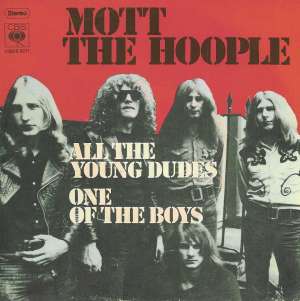
"All the Young Dudes" is a song written by English singer-songwriter David Bowie, originally recorded and released as a single by the English rock band Mott the Hoople in 1972 by Columbia Records. Bowie produced the song, which he had given to the band after they rejected his "Suffragette City". Bowie would subsequently record the song himself. Regarded as an anthem of glam rock, the song has received acclaim and was a commercial success. In 2021, Rolling Stone ranked "All the Young Dudes" number 166 in its list of the 500 Greatest Songs of All Time. It is also one of the Rock and Roll Hall of Fame's 500 Songs that Shaped Rock and Roll.

Jed Davis is an American musician based in New York City. He sings and plays keyboards as a solo artist and with The Hanslick Rebellion, Collider, and Skyscape.
Steven D Grossman was a singer-songwriter from the early 1970s whose debut album Caravan Tonight (1974) is distinguished as being the first album dealing with openly gay themes and subject matter to be released on a major label. Stephen Holden of Rolling Stone hailed it as "one of the most auspicious singer-songwriter debuts of the '70s."
Hayden Wayne is a modern American composer and librettist. Due to his background in popular music, his style is an amalgamation of classical music influenced by popular idioms. Wayne also has several film scores and award-winning commercials for television to his credit.

"We Hate It When Our Friends Become Successful" is a song by English singer-songwriter Morrissey from his third studio album, Your Arsenal (1992). It was released as the lead single from the album on 27 April 1992 by His Master's Voice (HMV). It was the first Morrissey single to be co-written with guitarist Alain Whyte and produced by glam rock guitarist Mick Ronson, known for his work with David Bowie as one of the Spiders from Mars. The song peaked at No. 17 on the UK Singles Chart and No. 9 in Ireland.
Jet were an English glam rock band from London, England, formed in 1974. They released one album in 1975 before splitting up, with the bulk of the band going on to become the punk/new wave band Radio Stars.
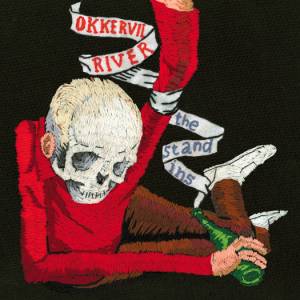
The Stand Ins is the fifth full-length studio album by American indie rock band Okkervil River, released on September 9, 2008. The album is the second half of The Stage Names, a planned double album. The title comes from the term 'stand-in', a person who substitutes for the actor before filming for technical purposes. If the cover art for The Stage Names is placed above that of The Stand-Ins, a complete picture is formed. The album charted at #42 with 11,000 copies sold, according to the Billboard 200.
Chris Robison was an American musician, songwriter and recording artist. He toured with the New York Dolls, Steam and John Lennon’s backing band, Elephant's Memory. He died in December 2021, at age 73
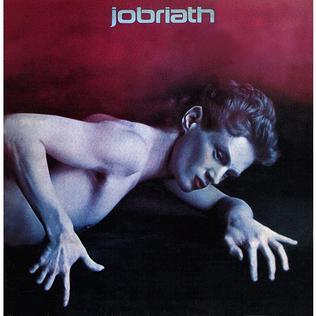
Jobriath is the first album by the American glam rock artist Jobriath and was released in 1973. The singer/songwriter's first album for Elektra, Jobriath was preceded by a significant promotional campaign, attempting to create an American counterpart to David Bowie. The album received positive reviews from critics, but sold poorly upon release. The album was recorded and co-produced by Eddie Kramer.
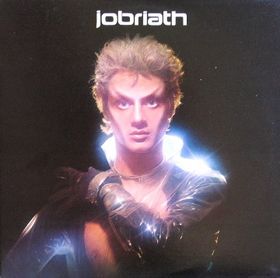
Creatures of the Street is the second album by the glam rock artist Jobriath. It was released in 1974 on Elektra Records. The album was compiled from the sessions for its predecessor. Highlights include the jaunty "Ooh La La", the almost folky "Scumbag", the orchestral "Dietrich/Fondyke" and "Movie Queen" from the previous album were originally intended to be one track.

Steven Patrick Morrissey, known mononymously as Morrissey, is an English singer and songwriter. He came to prominence as the frontman and lyricist of rock band the Smiths, who were active from 1982 to 1987. Since then, he has pursued a successful solo career. Morrissey's music is characterised by his baritone voice and distinctive lyrics with recurring themes of emotional isolation, sexual longing, self-deprecating and dark humour, and anti-establishment stances.

Jobriath A.D. is a 2012 American biographical documentary film written, produced and directed by Kieran Turner. The documentary details the rise and fall of the first openly gay rock star Jobriath. The film features commentary by Jerry Brandt, Joe Elliott, Marc Almond, Dennis Christopher, Will Sheff, Justin Tranter, Kristian Hoffman, and Ann Magnuson, and is narrated by Henry Rollins. Jobriath appears in archival footage. The film had its world premiere on March 29, 2012 at the London Gay & Lesbian Film Festival, and had additional screenings at the Frameline Film Festival, and the Florida Film Festival. It won the Best Documentary award at both the Out on Film festival and the Dublin Gay & Lesbian Film Festival. The film had a limited theatrical release on January 31, 2014, and was released to DVD in 2015.















